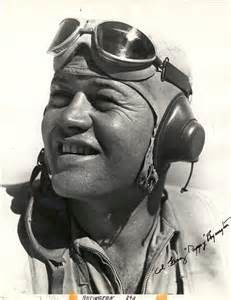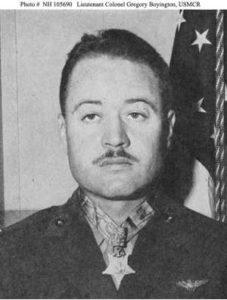Undoubtedly the most colorful and well known Marine Corps’ ace aviator was Colonel Gregory“ Pappy” Boyington.
Credited with the destruction of twenty-eight Japanese aircraft during WWII, he was the CO of the “Black Sheep” squadron flying Vought F4U Corsair fighters out of the Solomon Islands.
Enlisting in the Marines in 1935, he completed fight training at NAS Pensacola where he acquired the reputation of a hard-drinking, brawling and well-liked womanizer, but a top-notch pilot who could out-dogfight anyone.
His excessive drinking, borrowing money (and not repaying it), fighting and poor professional performance got him consistently in trouble with the brass. He once decked a superior officer in a fight over a girl (not his wife). He was haunted repeatedly by creditors.
He was about to be kicked out of Marine Corps aviation, when in late 1941, a call came out for pilots to join a group slated to fly for the Chinese in their war with Japan. They would not be military fliers officially, but would become employees of the “American Volunteer Group,” technically a private military contractor.
Boyington liked the money, which was double or triple the current his military salary. Plus, there was a bonus for each Japanese plane destroyed. Plus, it was a chance to fly the Curtiss P40s. Boyington jumped at the opportunity and the Corps was glad to be rid of him. It was a win-win.
The stateside press followed the exploits of the new “civilian air force” avidly and dreamed up the moniker “Flying Tigers” which stayed with the unit until they were disbanded in July 1942.
Boyington’s talent in the air didn’t extend to life on terra firma. The hard drinking, boisterous flyer clashed repeatedly with the leader of the Tigers, the strong-willed Maj. General Claire Chennault. It wasn’t long before Chennault had all he could stand and booted him out with a dishonorable discharge.
The Marines, who a few years before couldn’t wait to get rid of him, took him back. There was plenty of work for a good fighter pilot after Pearl Harbor. He was ordered to pull together a group of inexperienced, marginal pilots and whip them into an effective fighting squadron. Because he was about ten years older than his men, they called him “Gramps.”
His colorful reputation followed him, and the press laid the nickname “Black Sheep” on the new outfit. The “Sheep” delivered the goods, racking up 197 kills in eighty-four days. Boyington himself racked up three kills in a single day. War correspondents became interested in the hard-drinking, party-down fighter pilot and dreamed up another nickname that stuck, “Pappy.”
In January 1944 he was shot down and spent twenty grueling months as a POW. Beatings, interrogations and near starvation were the order of the day and when he was repatriated, he had lost eighty pounds.
Back in the U.S. after the war, he was awarded the Medal of Honor and the Navy Cross. He got in trouble almost immediately when, speaking on a War Bond tour after a few hours in a bar, he managed to embarrass himself, the Corps and the audience. The Corps had had it and cut him loose.
Spiraling downward like one of his Japanese victims into alcoholism, he bounced from job to job. He caught a break in the mid-seventies, when the TV show “Baa Baa Black Sheep” appeared. It was VERY loosely based on Pappy’s memoirs. Hired as a consultant to the show, it made him a celebrity for a time and life was good again.
Cancer ultimately grounded him, and Pappy died in 1988.



Thanks for sharing…Teddy Shapoo of New Bern flew with the Flying Tigers……..🇺🇸🇺🇸🇺🇸